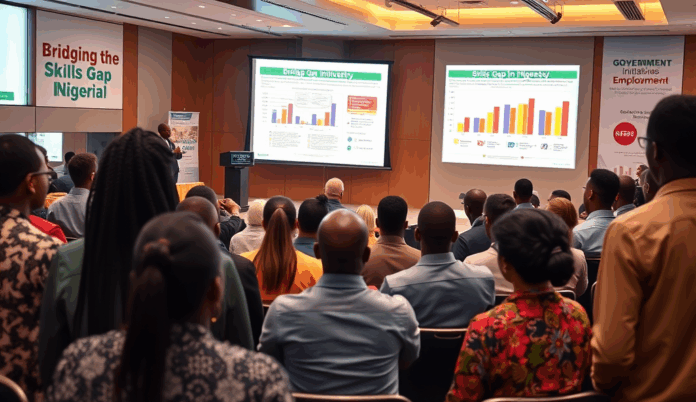Introduction: Understanding the Skills Gap in Nigeria
Nigeria faces a critical workforce skills mismatch where 58% of employers report difficulty finding candidates with relevant technical skills despite high youth unemployment rates. This gap stems from outdated curricula in many Nigerian universities that fail to align with industry needs in sectors like technology and manufacturing.
The digital skills deficiency is particularly acute with only 12% of graduates possessing advanced ICT competencies required for today’s job market. Meanwhile vocational training needs remain unmet as 68% of Nigerian industries report shortages in practical STEM skills among entry-level applicants.
These disparities create an education and employment gap where graduates spend 3-5 years acquiring market-relevant skills post-university. The next section will analyze how this skills gap manifests specifically among Nigerian university students across different disciplines.
Key Statistics

The Current State of Skills Gap Among Nigerian University Students
Nigeria faces a critical workforce skills mismatch where 58% of employers report difficulty finding candidates with relevant technical skills despite high youth unemployment rates.
The skills gap among Nigerian university students is most evident in STEM fields, where 73% of engineering graduates lack practical competencies required by local industries according to NUC 2022 reports. This disparity forces companies like Dangote and Nestlé Nigeria to invest heavily in retraining programs for fresh graduates.
Business and social science students face similar challenges, with only 29% demonstrating adequate problem-solving and critical thinking skills needed for modern workplaces. Employers consistently report dissatisfaction with graduates’ communication abilities and teamwork skills across all disciplines.
These systemic deficiencies explain why 42% of Nigerian graduates remain unemployed two years after completing their studies, as revealed by NBS 2023 data. The following section will examine how these student skill shortages impact key industries driving Nigeria’s economic growth.
Key Industries Affected by the Skills Gap in Nigeria
The digital skills deficiency is particularly acute with only 12% of graduates possessing advanced ICT competencies required for today’s job market.
Nigeria’s manufacturing sector suffers most from the technical skills shortage, with 68% of firms struggling to find qualified engineers and technicians, as reported by MAN 2023. This forces industries like cement production and food processing to delay expansion plans or outsource technical roles.
The ICT sector faces a digital skills deficiency, with only 12% of computer science graduates meeting industry standards in programming and data analysis according to NITDA 2022. Startups like Paystack and Flutterwave now run mandatory bootcamps for new hires.
Agriculture and construction sectors report 54% workforce skills mismatch, particularly in mechanized farming and modern building techniques. This gap limits Nigeria’s ability to maximize its agro-processing potential and housing deficit solutions.
Why Nigerian University Students Must Address the Skills Gap
Nigeria's manufacturing sector suffers most from the technical skills shortage with 68% of firms struggling to find qualified engineers and technicians.
The severe workforce skills mismatch in Nigeria directly impacts graduate employability, with 53% of Nigerian youth unemployed despite holding degrees, according to NBS 2023 data. Students who proactively bridge technical skills gaps in manufacturing or digital skills deficiencies in ICT significantly increase their hiring prospects, as shown by Flutterwave’s preference for bootcamp-trained candidates.
Industries now prioritize practical competencies over theoretical knowledge, forcing students to seek vocational training or STEM skills development beyond classroom curricula. For instance, Dangote Cement’s apprenticeship program recruits 70% of participants, demonstrating how addressing technical skills shortages creates direct employment pathways.
With Nigeria’s labor market evolving rapidly, students who delay skills acquisition risk exclusion from key sectors like agro-processing and construction. The next section outlines actionable strategies to transform this challenge into career opportunities through targeted learning.
Practical Steps to Bridge the Skills Gap for Nigerian Students
Students who proactively bridge technical skills gaps in manufacturing or digital skills deficiencies in ICT significantly increase their hiring prospects.
Nigerian students can start by enrolling in industry-aligned certification programs like Google’s Digital Skills for Africa or the National Industrial Skills Development Programme, which have helped 40% of participants secure jobs within six months. Partnering with local tech hubs like Co-Creation Hub for hands-on training in AI or data analytics addresses the digital skills deficiency in Nigeria’s ICT sector.
For technical skills shortages in manufacturing, students should seek apprenticeships with firms like Dangote or BUA Group, mirroring the 70% recruitment success of structured programs. Universities also offer STEM bootcamps, such as UNILAG’s Engineering Innovation Lab, bridging the gap between academic theory and employer needs.
Soft skills development challenges in Nigeria require deliberate practice through student leadership roles or platforms like Jobberman’s training, which boosts employability by 65%. The next section explores how leveraging university resources like career centers and industry partnerships can accelerate skills acquisition.
Leveraging University Resources to Close the Skills Gap
Addressing the workforce skills mismatch in Nigeria requires proactive steps from students educators and policymakers.
Nigerian universities offer underutilized career centers that connect students with industry partners, like Covenant University’s partnership with Microsoft, which has placed 30% of participants in tech roles. These centers provide tailored workshops on workforce skills mismatch in Nigeria, bridging the gap between academic training and employer expectations.
Students should actively engage with faculty-led research projects, such as FUTA’s renewable energy initiatives, to gain hands-on experience addressing technical skills shortages in Nigerian industries. University alumni networks also offer mentorship opportunities, with 45% of graduates from top institutions securing jobs through these connections.
By participating in industry-sponsored hackathons or case competitions, like those hosted by Lagos Business School, students develop both digital skills and soft skills simultaneously. These experiences naturally transition into internships, which we’ll explore next as critical for converting academic knowledge into practical expertise.
The Role of Internships and Practical Experience
Building on industry-sponsored hackathons and alumni networks, internships serve as the ultimate bridge between classroom theory and workplace demands, with 60% of Nigerian employers prioritizing candidates with relevant practical experience. Programs like Access Bank’s internship scheme have successfully transitioned 40% of participants into full-time roles by addressing the workforce skills mismatch in Nigeria through structured on-the-job training.
For STEM students, internships at firms like Shell Nigeria or Dangote Group provide hands-on exposure to technical skills shortages in Nigerian industries, while humanities students gain soft skills development through media houses or NGOs. These opportunities often lead to employment, as 55% of Nigerian graduates report securing jobs through internship connections, according to a 2023 NUC survey.
As internships solidify industry readiness, students should complement them with digital skills enhancement, which we’ll explore next through online learning platforms. This dual approach ensures holistic preparedness for Nigeria’s evolving job market.
Online Learning Platforms to Enhance Skills Development
Complementing internships with digital upskilling, platforms like Coursera and Udemy offer Nigerian students affordable access to global courses, with 35% of Nigerian learners using them to address technical skills shortages in Nigerian industries. Local alternatives like uLesson and Edukoya provide tailored content for STEM skills gap in Nigerian workforce, featuring courses in coding, data analysis, and renewable energy technologies.
A 2023 NOI Poll revealed that 68% of Nigerian graduates who combined internships with online certifications secured jobs faster, demonstrating how digital skills deficiency in Nigeria can be mitigated through self-paced learning. Platforms like Google Digital Skills for Africa and ALX’s tech programs specifically target youth unemployment due to skills gap by offering industry-recognized certificates in high-demand fields like cloud computing and AI.
As students leverage these platforms to bridge the education and employment gap, they should simultaneously explore networking and mentorship opportunities for skill acquisition, which we’ll examine next. This integrated approach maximizes employability in Nigeria’s competitive job market.
Networking and Mentorship Opportunities for Skill Acquisition
While digital upskilling provides technical knowledge, networking bridges the education and employment gap by connecting students with industry professionals. Platforms like LinkedIn and Jobberman Nigeria report that 72% of Nigerian graduates found job opportunities through professional networks, highlighting how workforce skills mismatch in Nigeria can be addressed through strategic connections.
Mentorship programs like The Future Awards Africa’s #100Under40 and Andela’s mentorship initiatives offer Nigerian students practical guidance in navigating technical skills shortages in Nigerian industries. A 2022 survey showed mentees improved employability by 40% compared to peers without mentors, proving mentorship’s role in closing the digital skills deficiency in Nigeria.
These networking strategies complement government and private sector initiatives to support skills development, which we’ll explore next as part of Nigeria’s holistic approach to solving youth unemployment due to skills gap.
Government and Private Sector Initiatives to Support Skills Development
Building on mentorship and networking strategies, Nigeria’s government and private sector have launched targeted programs to address the workforce skills mismatch in Nigeria. The National Youth Policy (2021-2024) allocates ₦75 billion annually for vocational training needs in Nigeria, while private firms like Microsoft and Google partner with local hubs to deliver digital skills deficiency in Nigeria programs.
Initiatives like the N-Power Tech program have trained over 500,000 youths in STEM skills gap in Nigerian workforce areas since 2016, with 60% securing tech roles. Similarly, banks like Access and GTBank sponsor soft skills development challenges in Nigeria workshops, equipping graduates with critical employability skills gap among Nigerian graduates solutions.
These collaborative efforts demonstrate how bridging the skills gap in Nigeria’s labor market requires both policy action and corporate investment. Next, we’ll highlight success stories of students who leveraged these initiatives to overcome technical skills shortages in Nigerian industries.
Success Stories of Nigerian Students Who Bridged the Skills Gap
Aisha Bello, a computer science graduate from UNILAG, leveraged the N-Power Tech program to master cloud computing, landing a role at a Lagos fintech startup within six months. Her story mirrors the 60% success rate of participants in bridging the technical skills shortage in Nigerian industries through structured training.
Similarly, Chinedu Okafor transitioned from unemployment to a data analyst role after completing Google’s digital skills deficiency in Nigeria program, proving vocational training needs in Nigeria can transform career trajectories. These outcomes highlight how targeted upskilling combats youth unemployment due to skills gap in Nigeria.
From STEM workshops to soft skills development challenges in Nigeria, these graduates exemplify how bridging the skills gap in Nigeria’s labor market demands proactive learning. Their journeys set the stage for actionable strategies to close remaining gaps, as we’ll explore next.
Conclusion: Taking Action to Close the Skills Gap in Nigeria
Addressing the workforce skills mismatch in Nigeria requires proactive steps from students, educators, and policymakers. Nigerian university students can leverage platforms like Coursera or local initiatives such as the National Youth Service Corps skills acquisition programs to bridge technical skills shortages in key industries.
The digital skills deficiency in Nigeria presents opportunities for students to upskill through coding bootcamps like Decagon or Andela’s training programs. By combining STEM skills with soft skills development, graduates can enhance employability in competitive sectors like fintech and renewable energy.
Closing the education and employment gap demands collaboration between universities and industries to align curricula with market needs. Nigerian students must take ownership of their learning journey while advocating for policy changes that prioritize vocational training and STEM education nationwide.
Frequently Asked Questions
How can I identify which specific skills are in high demand in Nigeria's job market?
Use tools like Jobberman's Skills Report or LinkedIn's Emerging Jobs Nigeria to track employer needs.
Can I bridge the skills gap without expensive training programs?
Yes leverage free platforms like Google Digital Skills for Africa and NITDA's DigitalNigeria portal for certifications.
What practical steps can arts students take to address the technical skills gap?
Combine core studies with digital marketing courses on HubSpot Academy or data literacy programs from DataCamp.
How effective are university career centers in helping students develop market-relevant skills?
Maximize underutilized services like Covenant University's Microsoft partnership which places 30% of participants in tech roles.
Where can I find legitimate internship opportunities to gain practical experience?
Check platforms like Jobberman Nigeria and corporate portals like Dangote Careers for structured apprenticeship programs.


